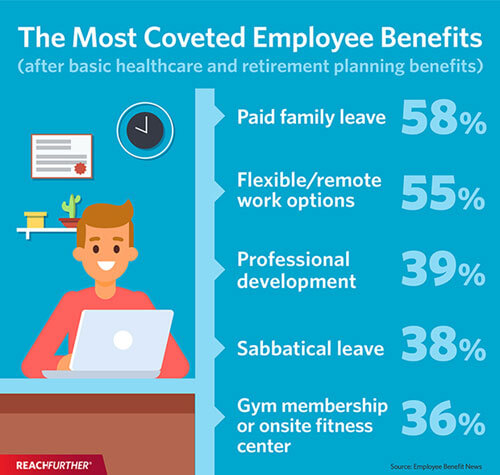Entrepreneur Insight
6 Tips on How to Best Hire and Manage Talent as Your Business Grows
By Casey Hynes

Vetting, finding, hiring and keeping the right people for your team
As a small business owner, you’re used to being in charge. From the day you launched your company, you’ve been at the helm of every department, making decisions on everything from products, to operating hours, to marketing. You’ve been in charge, all right—in charge of making sure that quite literally everything gets done.
But now your business has grown, and you’re ready to expand your team. To set your company up for success, you need to be really thoughtful about who you bring into the organization, and you need to be strategic about how you recruit them.
Here are some tips on how to hire and retain top-class employees who will help your business thrive:
1. Consider which benefits will attract great candidates
Federal law mandates that you offer certain benefits, including Workers’ Compensation, disability insurance (depending on your state), family leave and unemployment insurance, as noted by the SBA. You must also pay Social Security taxes for each employee.
Beyond that, you may choose to offer additional benefits, depending on how much money you have available for that purpose. As a small business, you may not be able to offer lavish perks, such as nap pods and all-expenses paid international retreats. But that’s not as important as you might think. Offering the benefits that matter to your prospective employees—such as affordable medical insurance, generous paid time off policies and flexible work options—is what will attract great candidates, said Anne Trinh, first vice president of human resources at East West Bank.

“Offering the benefits that matter to your prospective employees—such as affordable medical insurance, generous paid time off policies and flexible work options—is what will attract great candidates.”
“I think people are willing to take less to be a lot closer to home, because they don’t get paid while they’re sitting in their commute,” Trinh said. Providing the option to work from home, even a few days a week, may persuade top quality candidates to choose your company over a larger one. Quality of life matters deeply, especially to younger workers. You may not be able to provide top-tier salaries yet, but if you can provide quality-of-life benefits, you can make competitive offers.
2. Think about who you need to hire—and why they should work for you
Once you’re ready to recruit, think carefully about who would best suit your company right now. “It’s always good to start by assessing your current team and really identifying what the needs are,” said Carol Hamasaki, senior vice president and director of talent acquisition at East West Bank. What skills are lacking in the organization, and which are the most important to its continued success? Decide what your must-have skills are and what competencies you’re willing to train someone on. It’s unlikely that one candidate will tick every single box, so you need to know where you’re willing to compromise.
Then, craft a job posting that conveys what you’re looking for, and why great candidates should apply. Hamasaki said small businesses must be able to communicate their stories and missions because candidates are more discerning than ever about the types of companies for which they work.
“Nowadays, job seekers really want to understand the type of company they’re coming into, the environment, the culture,” she said. “Having a really great overview, telling that story, would be very appealing.”
“Nowadays, job seekers really want to understand the type of company they’re coming into, the environment, the culture. Having a really great overview, telling that story, would be very appealing.”

3. Build up your social media presence, then leverage it
Social media platforms can be great tools for marketing your company and promoting special offers and events. But if you regularly engage with your audience, these platforms can also help you attract great candidates. “I’ve seen a lot of people find good candidates through those postings,” Trinh said.
It makes sense that someone who follows you and has likely used your product or service is probably already excited about what you’re doing. Even if they’re not suited for the position you’ve advertised, they may pass on the posting to someone in their network, expanding your pool of potential candidates.
Hamasaki noted that social media is also a cost-effective way of getting the word out, since you can share your listings for free on social accounts. She added that word-of-mouth—another free tactic—is still one of the most popular ways for businesses to source talents, so let your professional network know you’re hiring. The best candidates may come from those referrals.
4. Vet candidates with your application instructions
Trinh related advice from a small business owner who included particular instructions when hiring for her yogurt shop. “I specifically said, ‘put this in the subject line, attach this, and tell me these three things,’ and you’d be surprised how many people did not follow directions,” Trinh says the entrepreneur told her.
Rather than being an exercise in frustration, those instructions filtered out applicants who lacked attention to detail, leaving the business owner with focused candidates with whom she connected right away. Including a set of easy-to-follow, but specific, instructions will help you determine not just who is paying attention, but who cares enough about this opportunity to get their application right. Someone who rushes through the process without heeding your request probably lacks respect and enthusiasm for your particular business, as they’re just looking to land any job.
5. Go deep with your interview questions
Anyone can answer questions about their skill sets, and sometimes those are the most important conversations to have. When you’re first hiring an accountant, you may care less about shared passions and more about a candidate’s track record of working with companies similar to yours. The emphasis is on hard skills and a keen understanding of financial laws and compliance issues.

“I specifically said, ‘put this in the subject line, attach this, and tell me these three things,’ and you’d be surprised how many people did not follow directions.”
However, when you’re hiring for skills and for relevant interests, make sure you probe at those topics during the interview. “A lot of interviewees are really good at telling you what you want to hear,” Trinh said. “But that doesn’t always translate into a good employee on that job.”
Ask interviewees industry-specific questions to determine their actual level of knowledge about the field. Invite their opinions on industry trends, and ask follow-ups to their responses. If you’ve asked them about a previous experience, have them elaborate. Let them walk you through their thought process and how they would solve a particular problem they might encounter at your company. Those types of questions will give you a richer understanding of their experience and whether they are genuinely suited to this role.
Passion is also an important differentiator if you’re hiring for potential, Trinh said. You won’t require entry-level employees to have extensive experience, but you want to know how closely they’ve been following the industry and what they hope to contribute. That kind of engagement signifies whether they’ll truly be able to support your company.
6. Invest in your employees
Hiring is only half of the equation. You also need a plan for retaining them, especially considering that you can spend up to 33 percent of an employee’s salary on replacement costs if they quit. Strong retention also fosters bonds among employees, deepening their sense of investment in the company’s success.
To nurture those long-term relationships, Hamasaki recommends rewarding good performance. Bonuses are always welcome, but think beyond monetary compensation, she said.
“Business owners can create a career path for their employees by helping them grow and expand their skill sets,” she said. Small businesses are uniquely suited to this because employees can wear multiple hats and become more well-rounded as they develop new competencies.
Hamasaki echoed Trinh’s points on flexible work arrangements. Employees value the chance to set their own schedules or take time off as needed to attend to personal needs. “Treat employees like people—respect and honor personal time off,” she said.
Finally, Hamasaki emphasized creating a positive work environment and a culture of transparency and respect.
Sign up for the Reach Further Newsletter
We’ll keep you in the know about the latest US-Asia business news and trends.
Suscríbase al boletín Reach Further
Lo mantendremos informado sobre las últimas noticias y tendencias comerciales entre Estados Unidos y China.

